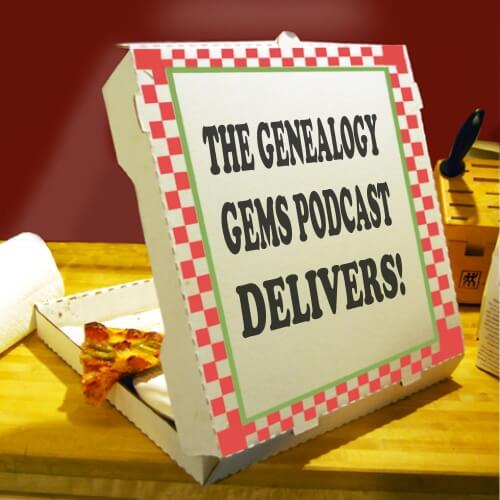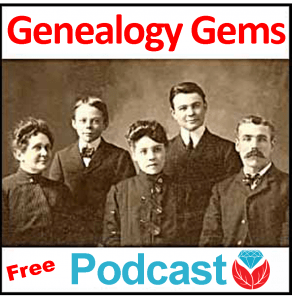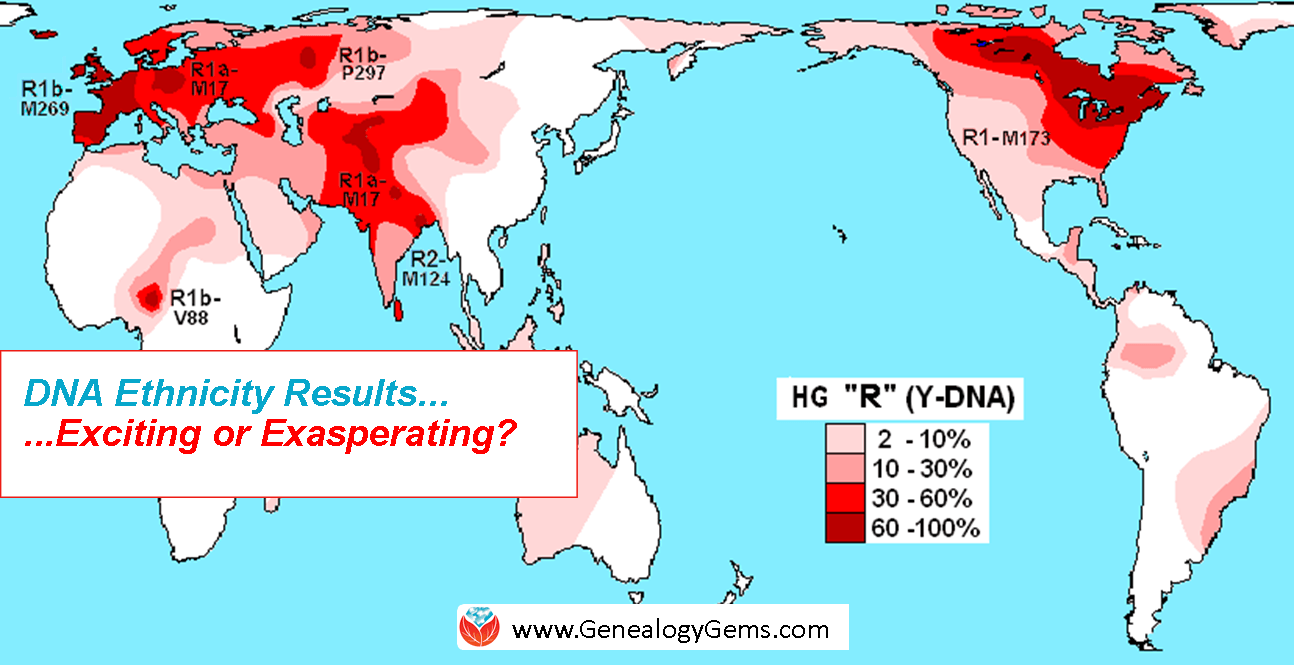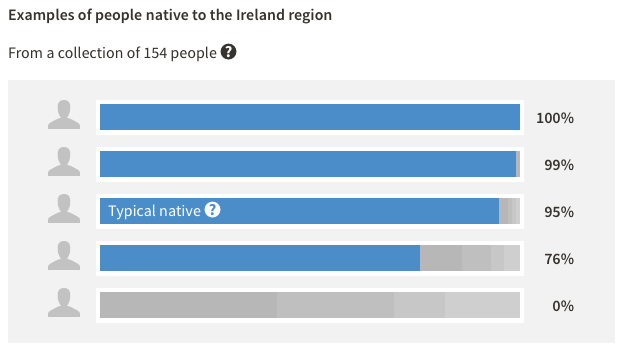by Lisa Cooke | Nov 13, 2018 | 01 What's New, Genealogy Gems Podcast |

Pandora is now poised for podcast delivery!
Podcasts have always faced an obstacle: it just hasn’t been that easy to find them or listen.
After I launched The Genealogy Gems Podcast in early 2007, I spent most of my time trying to explain to potential listeners how to “subscribe” to the show. Along came the smartphone, and eventually podcast apps, and things got a little easier. In 2010 we launched our own Genealogy Gems Podcast app in hopes of improving the listener experience even more. That’s great for those tenacious enough to find us in the first place, but what about everybody else? Also though podcasts have experienced a huge surge in popularity thanks to the viral Serial podcast, 83% of Americans still aren’t listening on a weekly basis.
Pandora, the largest streaming music provider entered the game today and plans to change all that. And thanks to you, our loyal listeners, The Genealogy Gems Podcast has been selected by Pandora as part of their initial offering of podcasts!
Read below how this music giant is going to tap technology and human curation to recommend podcasts to those who are sure to love them. I’m sure that once Americans discover through Pandora that their family history is just waiting to be discovered, and that The Genealogy Gems Podcast is here to help them do just that, we’ll be welcoming many new listeners. Keep reading for all the details from Pandora. And, be sure to sign up for the early access offering here. You can expect to start seeing our show on Pandora sometime in December.

Thanks for listening friend!
Lisa Louise Cooke
PRESS RELEASE
OAKLAND, Calif.–(BUSINESS WIRE)–Pandora (NYSE:P), the largest streaming music provider in the U.S., today unveiled its podcast offering, powered by the Podcast Genome Project, a cataloging system and discovery algorithm that uses a combination of technology and human curation to deliver personalized content recommendations. Beginning today, Pandora will roll out beta access to select listeners on mobile devices. Those interested in early access to the offering can sign-up here, with general availability in the coming weeks.
“It might feel like podcasts are ubiquitous, but, eighty-three percent of Americans aren’t yet listening to podcasts on a weekly basis, and a majority of them report that’s because they simply don’t know where to start,” said Roger Lynch, Chief Executive Officer, Pandora. “Making podcasts – both individual episodes and series – easy to discover and simple to experience is how we plan to greatly grow podcast listening while simultaneously creating new and more sustainable ways to monetize them.”
Similar to how its namesake the Music Genome Project has helped Pandora become the best and easiest way to discover music online since 2005, the Podcast Genome Project recommends the right podcasts to the right listeners at the right time, solving the questions, “is there a podcast that’s right for me?” and “what should I listen to next?” It evaluates content based on more than 1500 attributes – spanning MPAA ratings, timely and evergreen topics, production style, content type, host profile, etc – and listener signals including thumbs, skips and replays. It also utilizes machine learning algorithms, natural language processing, and collaborative filtering methods for listener preferences. And, similar to the Music Genome Project, the Podcast Genome Project combines these techniques with our expert in-house curation team to offer episode-level podcast recommendations that reflect who you are today and evolve with you tomorrow.
“With the introduction of podcasts, listeners can now easily enjoy all of their audio interests – music, comedy, news, sports, or politics – on Pandora, the streaming service that knows their individual listening habits the best,” said Chris Phillips, Chief Product Officer, Pandora. “The Podcast Genome Project’s unique episode-level understanding of content knows exactly what podcast you’ll want to discover next, and will serve it up through a seamless in-product experience that is uniquely personalized to each listener and will continue to grow with their tastes over time.”
At launch, Pandora has partnered with top-tier publishers including APM, Gimlet, HeadGum, Libsyn, Maximum Fun, NPR, Parcast, PRX+PRI, reVolver, Slate, The New York Times, The Ramsey Network, The Ringer, WNYC Studios, and Wondery, and will continue to feature existing podcast content including Serial, This American Life and Pandora’s original Questlove Supreme, with many more to come in the future. These partnerships introduce hundreds of popular podcasts across a wide variety of genres including News, Sports, Comedy, Music, Business, Technology, Entertainment, True Crime, Kids, Health and Science, offering inspiring audio experiences for a variety of diverse interests.
ABOUT PANDORA
Pandora is the world’s most powerful music discovery platform – a place where artists find their fans and listeners find music they love. We are driven by a single purpose: unleashing the infinite power of music by connecting artists and fans, whether through earbuds, car speakers, live on stage or anywhere fans want to experience it. Our team of highly trained musicologists analyze hundreds of attributes for each recording which powers our proprietary Music Genome Project®, delivering billions of hours of personalized music tailored to the tastes of each music listener, full of discovery, making artist/fan connections at unprecedented scale. Founded by musicians, Pandora empowers artists with valuable data and tools to help grow their careers and connect with their fans.
www.pandora.com| @pandoramusic | www.pandoraforbrands.com | @PandoraBrands | amp.pandora.com
by Lisa Cooke | Nov 24, 2015 | 01 What's New, British, DNA, Irish, Listeners & Readers
Are your DNA ethnicity results exciting, confusing, inconsistent, exasperating…or all of the above?
Recently Kate expressed on the Genealogy Gems Facebook page her frustration with her ethnicity results provided by AncestryDNA. She gets right to the point when she writes, “the way they refer to the results is confusing.”
Kate, you are not alone. Many genealogists have been lured into taking the autosomal DNA test at one of the three major DNA testing companies just to get this glimpse into their past. Remember that the autosomal DNA test can reveal information about both your mother’s side and your father’s side of your family tree. Many take the test hoping for confirmation of a particular ancestral heritage, others are just curious to see what the results will show. Though their purposes in initiating the testing may vary, the feeling of bewilderment and befuddlement upon receiving the results is fairly universal.
Kate has some specific questions about her results that I think most will share. Let’s take a look at a couple of them. First up, Kate wants to know if our family tree data in any way influences the ethnicity results provided. The answer is an unequivocal “no.” None of the testing companies look at your family tree in any way when determining your ethnicity results. However, the results are dependent on the family trees of the reference population. The reference populations are large numbers of people whose DNA has been tested and THEIR family history has been documented for many generations in that region. The testing companies compare your DNA to theirs and that’s how they assign you to an ethnicity (and place of ancestral origin?).
Next Kate asks, “Do they mean England when they report Great Britain?” Or to put it more broadly, how do these testing companies decide to divide up the world? All of the companies handle this a little bit differently. Let’s look at Ancestry as an example. When you login to view your ethnicity results, you can click on the “show all regions” box below your results to get a list of all of the possible categories that your DNA could be placed in. These 26 categories include nine African regions, Native American, three Asian regions, eight European regions, two Pacific Island regions, two West Asian regions, and then Jewish, which is not a region, per se, but a genetically distinct group.
Clicking on each individual location in the left sidebar will bring up more information on the right about that region. For example, clicking on Great Britain tells us that DNA associated with this region is primarily found in England, Scotland, and Wales, but is also found in Ireland, France, Germany, Denmark, Belgium, Netherlands, Switzerland, Austria, and Italy. Basically, this is telling us that people with generations of ancestry in Great Britain are quite a genetic mix from many areas.
The first chart here shows that if we are to test the DNA of 100 natives of one of these primary regions (England, Scotland or Wales) then 50 of them willhave the great Britain “pattern” of DNA covering 60% or more of their entire genome, and 50 of them will have that pattern in less than 60% of their DNA. The fact that this half-way number is so low, only 60%, tells us that there is a lot of uncertainty in this ethnicity estimate because there is so much mixture in this region. Kate, for you that means that when you see Great Britain in your ethnicity estimate, it could mean England, or maybe it means Italy- Ancestry can’t be certain.

But that uncertainty isn’t the same for every region. Pictured here is also the ethnicity chart for Ireland. You can see that half the people who are native to Ireland will have 95% or more Irish DNA. Kate, for us this means that if you have Irish DNA in your results, you can be pretty certain it came from Ireland. From these tables you can see your membership in some regions is more robust than others, and Ancestry is using these tables to try to help us tell the difference.

In the end, the ethnicity results reported by each DNA testing company are highly dependent on two factors: the reference populations they use to compare your DNA against, and the statistical algorithms they use to compute your similarities to these populations. Every company is doing both of these things just a little bit differently.
Kate, if you want to get another take on your ethnicity results, you can take your data over to Family Tree DNA, or you can be tested at 23andMe. A free option is to head over to Gedmatch and try out their various ethnicity tools. If you need help downloading and transferring, you can head over to my website: http://www.yourdnaguide.com/transferring. Most people have found after searching in multiple places that their “true” results are probably somewhere in the middle.
While these ethnicity results can be interesting and useful, for most they will just be a novelty; something interesting and exciting. I have found that their most useful application is acting like a fly on a fishing line. They attract our family members into DNA testing where we can then set the hook on the real goal: family history.
If you’re ready to bait your own hook, I recommend you check out my series of DNA quick guides. These guides will help you choose the right DNA tests for your genetic genealogy questions. You’ll become a smart shopper, more prepared to choose the testing company that’s right for you. And you’ll be prepared to maximize your results from each company, rather than look at them blankly and wondered what the heck you just spent that money on. Click here to see all my DNA guides: I recommend the value-priced bundle!
Disclosure: This article contains affiliate links and Genealogy Gems will be compensated if you make a purchase after clicking on these links (at no additional cost to you). Thank you for supporting Genealogy Gems!






